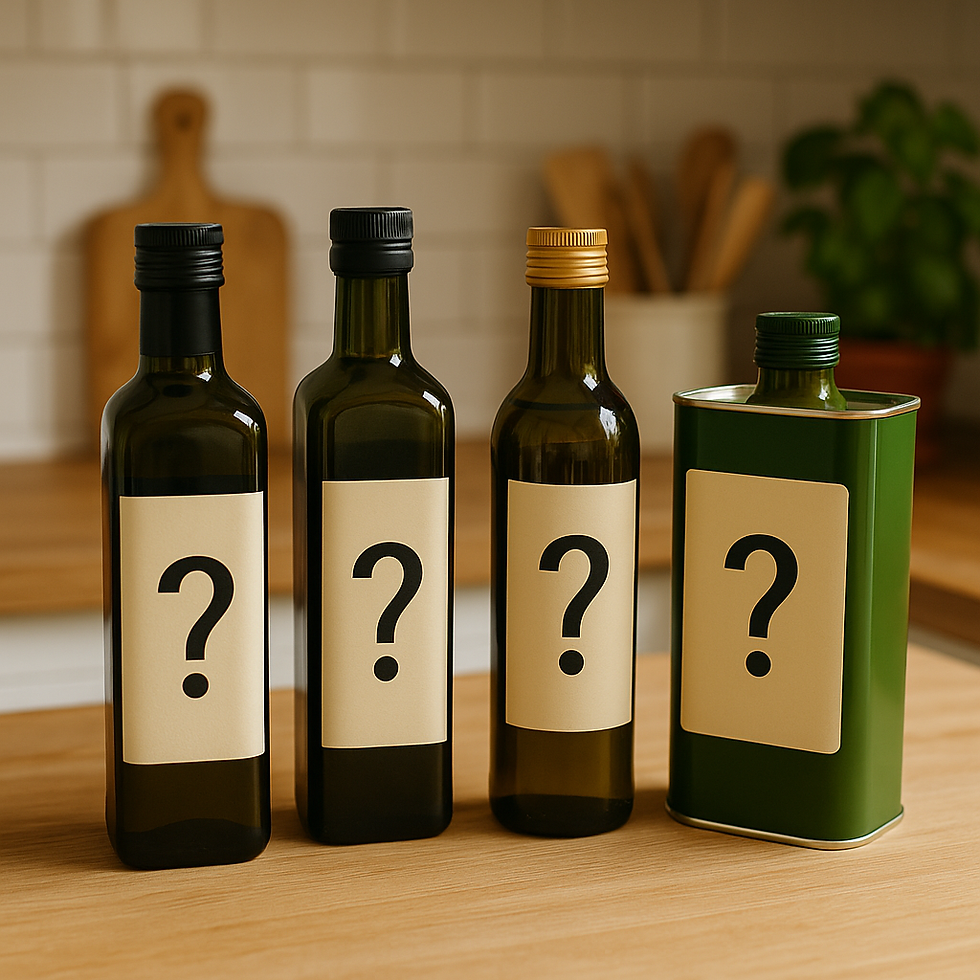Pilates Self-Care Saturday: Finding the Best Olive Oil in the UK
- Michael King

- Jul 26, 2025
- 3 min read

I’ll admit it. I'm obsessed with olive oil. Having lived in Greece for several years, I became completely hooked on the real thing. Rich, peppery, fragrant and full of life. You get used to the good stuff fast, and when you do, going back to supermarket olive oils in the UK can be a bit of a shock.
What looks like a premium product often isn’t. And recently, I came across a few reports that really confirmed my suspicions. Some of the most recognisable olive oil brands lining our supermarket shelves are, quite frankly, not what they claim to be.
One well known brand that looks luxurious came ninth out of ten in a blind taste test conducted by Which?, described as musty, bitter and stale. More worrying, lab tests showed its antioxidant content, polyphenols, was 60 percent lower than industry expectations.
Another classic kitchen staple failed authenticity tests, found to contain over 30 percent refined seed oils. So it was labelled as extra virgin, but didn’t even legally count as olive oil in parts of Europe. And the worst? One bestselling bottle was found to be up to 18 months old before it even reached UK supermarket shelves. That means the oil is already oxidised and nutritionally degraded before it touches your salad.
So what’s going on?
There’s a big gap between what’s marketed and what’s in the bottle. As Pilates teachers, we pay close attention to what goes into our bodies, not just how we move them. It’s not just about flavour, it’s about supporting our health.
What to look for in a good olive oil
Here are five quick tips that help cut through the marketing and guide you to a better bottle
1. Look for a harvest dateNot just a best before. A good oil will show when the olives were picked. The fresher, the better.
2. Choose dark glass or tinsLight damages olive oil. Skip anything in clear plastic or clear glass.
3. Stick to cold pressed extra virginBoth terms matter. Cold pressed means the oil hasn’t been damaged by heat. Extra virgin means minimal processing.
4. Avoid blends or vague sourcesIf it says EU blend, it’s likely from multiple countries and harder to trace. Look for oils that name the region or estate.
5. Use it quicklyBuy smaller bottles and use them within a few months. Olive oil doesn’t get better with age once opened.
So which olive oils are actually worth buying?
Luckily, there are some standouts that have been tested and reviewed by independent panels and experts.
Supermarket Best Buys from Which? and The Guardian
Aldi Specially Selected Terra di Bari Castel del Monte – high flavour, excellent freshness and around £5 to £6
Asda Extra Special Spanish Picual – rich, balanced taste and good nutritional profile
Sainsbury’s Taste the Difference Toscano – peppery and buttery, great for finishing dishes
Farchioni Il Casolare, found at Asda and Ocado – unfiltered, earthy and authentic
These outperform many well known brands in both taste and value.
Specialist award winning oils available online in the UK
Bravoleum Picual – ranked one of the world’s best, grassy, vibrant and full of polyphenols
Nobleza del Sur Eco Night Organic Blend – deep flavour, beautiful packaging and full organic traceability
Castillo de Canena Family Reserve Picual – consistently awarded for flavour and antioxidant richness
Frantoi Cutrera Primo from Sicily – fruity and complex, from a single estate on Mount Etna’s slopes
These oils often come from small producers and offer a completely different experience, closer to what you’d find in a Greek or Italian village.
So next time you're shopping, treat olive oil not as a luxury but as part of your self care. It’s the foundation of a healthy kitchen and deserves the same attention we give to our alignment, our breath and our movement.
And if you find one you love, let it become part of your practice.




Comments